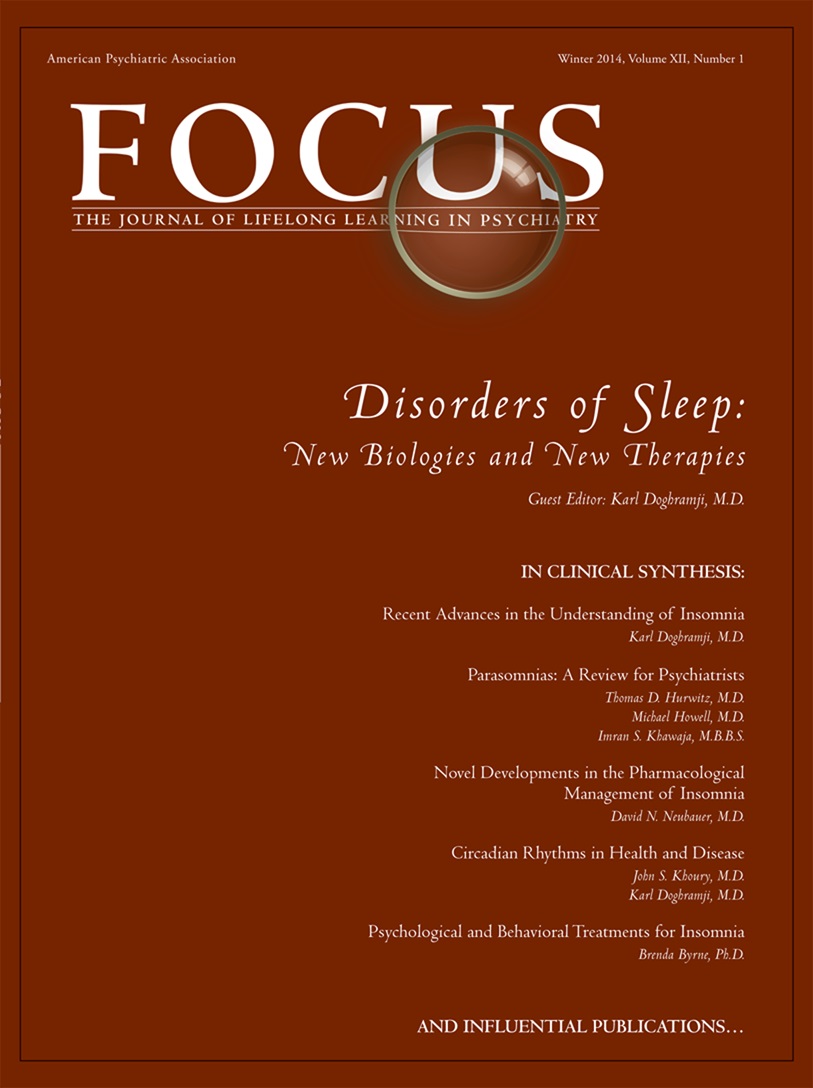This issue of Focus is dedicated to the update and review of major developments in our understanding and management of sleep disorders, with an emphasis on those disorders that are commonly confronted by psychiatrists and other mental health practitioners. A staggering one-third of all humans are affected by sleep disorders. Sleep-related complaints are also disproportionately high in prevalence in psychiatric practice, and are actively expressed by patients suffering from almost all major psychiatric conditions. Proper identification, clinical evaluation, and effective management of sleep disorders are, therefore, of significant importance for psychiatrists.
In the first paper, “Recent Advances in the Understanding of Insomnia,” I explore key developments in clarifying the pathophysiology of insomnia, and explain how these have led to an evolution of our view of the relationship between co-occurring insomnia and medical/psychiatric disorders from a model of unidirectional causality to one of autonomous disorders interacting in a bidirectional fashion. I also clarify how these constructs are reflected in the newly introduced DSM-5 diagnostic nosology. Pharmacological agents have played a crucial role in the management of insomnia for many decades; in his paper, “Novel Developments in the Pharmacological Management of Insomnia,” Dr. David Neubauer explores the many available agents and provides an evidence-based approach in their selection and use. Whereas GABA receptor agonists have dominated the therapeutic armementarium, Dr. Neubauer reviews novel and investigational agents with mechanisms traversing the receptor systems that are involved in the control of sleep and arousal, such as selective histamine H1 receptor antagonists, selective melatonin receptor agonists, and dual orexin receptor antagonists. “Natural” compounds enjoy a significant allure by virtue of their widespread availability, and the perception that they are safer than prescription medications for insomnia. In his “Ask the Expert” column, Dr. Milton Erman explores the array of products most commonly utilized for sleep-related complaints and provides empirical data to guide practitioners through the morass of widespread claims regarding the benefits of these agents. Although less widely utilized than pharmacological agents, cognitive and behavioral therapies are of clear benefit in insomnia. In her paper entitled, “Psychological and Behavioral Treatments for Insomnia,” Dr. Brenda Byrne explores the principles underlying these techniques and guidelines in their implementation. She also reviews exciting new evidence demonstrating the lasting benefit of these therapies for extended periods of time following termination of treatment. Dr. John Khoury and myself, in our paper entitled, “Circadian Rhythms in Health and Disease,” review our current understanding of the neurophysiology of the circadian regulation system, which encompasses a complex array of physiological and psychological variables including core body temperature, hormone secretion, hunger, mood, and sleep, among others. We then explain how misalignments in the timing of these variables can lead to circadian rhythm disorders, and explore many of the treatment modalities that can be utilized in the context of psychiatric practice for these disorders. Finally, in their paper, entitled “Parasomnias, A Review for Psychiatrists,” Drs. Thomas Hurwitz, Michael Howell, and Imran Khawaja review a fascinating group of behavioral disturbances that occur in the borderlands between sleep and wakefulness that are often confused with psychiatric disorders. The authors explore a systematic approach for the evaluation and management of these disorders, which can lead to serious injury, and which often disrupt relationships.
I am grateful to the contributors of this issue of Focus, all of whom are prominent researchers, educators, and clinicians in the field of sleep medicine. I am confident that you will find their state-of-art papers to be informative and clinically relevant.

